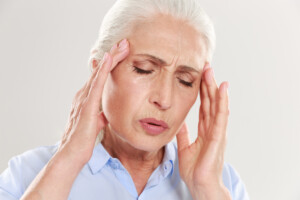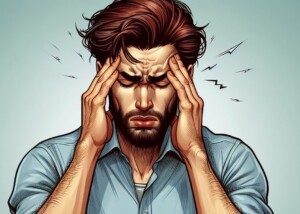Is there a way to tell if your sudden dizziness is a stroke or TIA or something less serious?
What if the dizziness comes and goes and there’s no other symptoms? What if it’s enough to make you lose balance and fall?
“Dizziness is a complicated disease symptom which should first be triaged and then treated by the appropriate specialist — which could be a neurologist, cardiologist or ear, nose and throat [ENT] specialist — depending on the cause of the symptoms,” explains Dr. Jacob Hascalovici MD, PhD,who’s with the Department of Neurology at Hackensack Meridian Health.
Dr. Hascalovici continues, “A careful medical history is one of the most important and effective first steps in dealing with this symptom.”
This will include asking the patient if they took a bad fall or got hit in the head within the past few months.
They’ll also be asked if they’ve had any facial weakness or numbness, slurred speech, one-sided body weakness, clumsiness or paralysis, even for only seconds.
If any of these symptoms accompany your dizziness, this is highly suspicious for a stroke or transient ischemic attack (TIA). It’s very unlikely that a stroke or TIA would cause only dizziness.
“The history can help determine if the symptoms represent actual dizziness (lightheadedness or the feeling of pre-syncope) or vertigo, which is often mischaracterized as dizziness — but refers to a specific room-spinning sensation,” says Dr. Hascalovici.
Lightheadedness doesn’t always feel like the dizziness that one would feel after spinning around on a swing or stool, and can be caused by low blood sugar.
A person can feel a sensation of “dizziness” if they’ve been physically exerting themselves too hard with inadequate hydration and nutrients.
“Actual dizziness is usually a cardiac issue due to a host of abnormalities which can include low blood pressure, being dehydrated or having an abnormal heart rhythm, to name a few.
“In most cases the neurological examination is normal in the case of dizziness.
“If vertigo is suspected the next step would be to differentiate between central (most often stroke related) or peripheral vertigo.
“Central vertigo rarely presents itself with isolated symptoms of vertigo, so a careful neurological examination should reveal other gross neurological abnormalities such as weakness, visual impairment or problems with coordination, to name a few examples.
“Furthermore, co-morbid vascular risk factors linked to increased stroke risk such as diabetes, hypertension, high cholesterol, history of smoking and obesity should increase one’s index of suspicion for central vertigo (stroke related).
“Neurologists are best equipped to manage central vertigo.
“Peripheral vertigo is usually caused by an inner ear problem, and therefore ENT expertise can be helpful.
“In peripheral vertigo, aside from nystagmoid eye movements which can often be seen, the gross neurological examination is generally normal, and patients are provided with supportive care until the symptoms resolve.”
Peripheral vertigo – which may be described as “dizziness” by a patient who simply does not know how else to describe the symptom – can be severe enough to cause the patient to lose balance and fall, or become nauseous and vomit.
This isn’t true dizziness. It’s the sensation of the room spinning and maybe even tilting. The name of the disorder is BPPV: benign paroxysmal positional vertigo.
The Epley maneuver, which a doctor can perform right in the office, is usually quite effective at immediately relieving the symptoms.
Dr. Jacob Hascalovici, aka “Dr. Jacob,” is a diplomat of the American Board of Psychiatry and Neurology in both adult neurology and pain medicine, and is a clinical assistant professor of neurology, physical medicine & rehabilitation and anesthesiology at Albert Einstein College of Medicine.
 Lorra Garrick is a former personal trainer certified through the American Council on Exercise. At Bally Total Fitness she trained women and men of all ages for fat loss, muscle building, fitness and improved health.
Lorra Garrick is a former personal trainer certified through the American Council on Exercise. At Bally Total Fitness she trained women and men of all ages for fat loss, muscle building, fitness and improved health.
.




























